 W
WThe American Youth Congress (AYC) was an early youth voice organization composed of youth from all across the country to discuss the problems facing youth as a whole in the 1930s. It met several years in a row - one year it notably met on the lawn of the White House. The delegates are known to have caused a disturbance when they attempted to access the United States Congress. They focused on the draft, which was taking youths at age 18 off to war. At the time in the United States one was not legally an adult in any way until the age of 21. They also focused on the economic exploitation of youth.
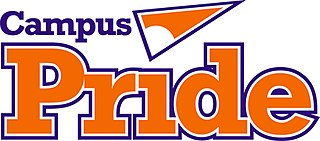 W
WCampus Pride is an American national nonprofit 501(c)(3) organization founded by M. Chad Wilson, Sarah E. Holmes and Shane L. Windmeyer in 2001 which serves lesbian, gay, bisexual and transgender (LGBT) and ally student leaders and/or campus organization in the areas of leadership development, support programs and services to create safer, more inclusive LGBT-friendly colleges and universities.
 W
WChild labour refers to the exploitation of children through any form of work that deprives children of their childhood, interferes with their ability to attend regular school, and is mentally, physically, socially or morally harmful. Such exploitation is prohibited by legislation worldwide, although these laws do not consider all work by children as child labour; exceptions include work by child artists, family duties, supervised training, and some forms of child work practiced by Amish children, as well as by indigenous children in the Americas.
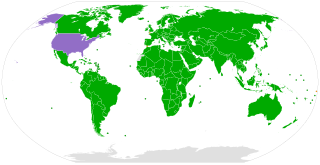 W
WThe United Nations Convention on the Rights of the Child is an international human rights treaty which sets out the civil, political, economic, social, health and cultural rights of children. The Convention defines a child as any human being under the age of eighteen, unless the age of majority is attained earlier under national legislation.
 W
WA crossing sweeper was a person working as a street sweeper who would sweep a path ahead of people crossing dirty urban streets in exchange for a gratuity. This practice was an informal occupation among the urban poor, primarily during the 19th century. It was the focus of fairly intense study and commentary, and attitudes toward the presence of crossing sweepers on city streets varied greatly among urban residents, ranging from appreciation for their work to feelings that they were a public nuisance. Crossing sweepers also found their way into 19th-century fiction and artwork, including a novel by Charles Dickens and a popular painting by William Powell Frith.
 W
WEscape from Childhood: The Needs and Rights of Children is a book by John Caldwell Holt. ISBN 978-0-345-24434-5
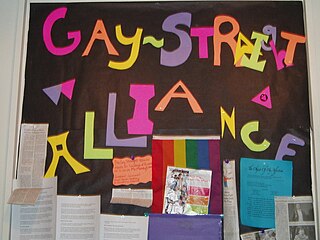 W
WA Gay–Straight Alliance, Gender-Sexuality Alliance (GSA) or Queer–Straight Alliance (QSA) is a student-led or community-based organization, found in middle schools and high schools as well as colleges and universities, primarily in the United States and Canada, that is intended to provide a safe and supportive environment for lesbian, gay, bisexual, and transgender (LGBT) children, teenagers, and youth as well as their cisgender heterosexual allies. In middle schools and high schools, GSAs are overseen by a responsible teacher. The first GSAs were established in the 1980s.
 W
WThe Lowell mill girls were young female workers who came to work in industrial corporations in Lowell, Massachusetts, during the Industrial Revolution in the United States. The workers initially recruited by the corporations were daughters of New England farmers, typically between the ages of 15 and 35. By 1840, at the height of the Textile Revolution, the Lowell textile mills had recruited over 8,000 workers, with women making up nearly three-quarters of the mill workforce.
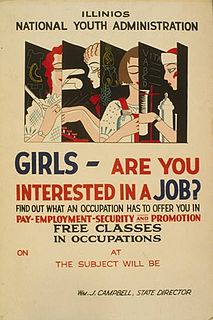 W
WThe National Youth Administration (NYA) was a New Deal agency sponsored by the Presidency of Franklin D. Roosevelt in the United States that focused on providing work and education for Americans between the ages of 16 and 25. It operated from June 26, 1935 to 1939 as part of the Works Progress Administration (WPA) and included a Division of Negro Affairs headed by Mary McLeod Bethune who worked at the agency from 1936 to 1943. Following the passage of the Reorganization Act of 1939, the NYA was transferred from the WPA to the Federal Security Agency. In 1942, the NYA was transferred to the War Manpower Commission (WMC). The NYA was discontinued in 1943.
 W
WThe newsboys' strike of 1899 was a U.S. youth-led campaign to force change in the way that Joseph Pulitzer and William Randolph Hearst's newspapers compensated their force of newsboys or newspaper hawkers. The strikers demonstrated across the city for several days, effectively stopping circulation of the two papers, along with the news distribution for many New England cities. The strike lasted two weeks, causing Pulitzer's New York World to decrease its circulation from 360,000 papers sold per day to 125,000. Although the price of papers was not lowered, the strike was successful in forcing the World and Journal to offer full buybacks to their sellers, thus increasing the amount of money that newsies received for their work.
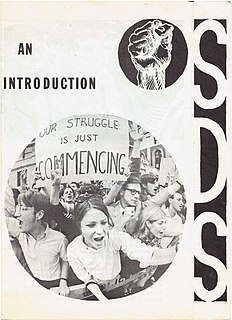 W
WStudents for a Democratic Society (SDS) was a national student activist organization in the United States during the 1960s, and was one of the principal representations of the New Left. Disdaining permanent leaders, hierarchical relationships and parliamentary procedure, the founders conceived of the organization as a broad exercise in "participatory democracy." From its launch in 1960 it grew rapidly in the course of the tumultuous decade with over 300 campus chapters and 30,000 supporters recorded nationwide by its last national convention in 1969. The organization splintered at that convention amidst rivalry between factions seeking to impose national leadership and direction, and disputing "revolutionary" positions on, among other issues, the Vietnam War and Black Power.
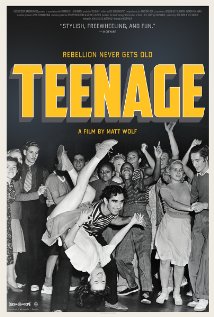 W
WTeenage is a 2013 documentary film directed by Matt Wolf and based on Jon Savage's book Teenage: The Creation of Youth Culture. In the documentary, Wolf attempts to bring to life the "prehistory" of youth culture which preceded and evolved into the concept of teenage culture in the 1950s and beyond. The film had its world premiere at the Tribeca Film Festival on April 20, 2013. and was released in a limited release and through video on demand on March 14, 2014, by Oscilloscope Laboratories.
 W
WThe Teenage Liberation Handbook: How to Quit School and Get a Real Life and Education, which was published in 1991 by Grace Llewellyn, is a book about unschooling and youth empowerment. Largely inspired by John Holt's educational philosophy, the book encourages teenagers to leave full-time school and to allow their curiosity about the world to guide their learning. It includes suggestions and resources regarding traditional academic areas, as well as chapters about talking to parents, social life, college, and exploring the world.
 W
WThe timeline of young peoples' rights in the United States, including children and youth rights, includes a variety of events ranging from youth activism to mass demonstrations. There is no "golden age" in the American children's rights movement.
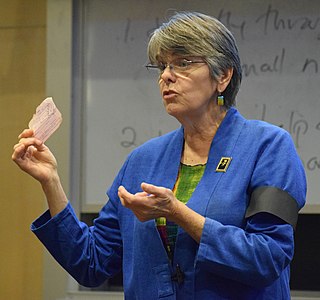 W
WMary Beth Tinker is an American free speech activist known for her role in the 1969 Tinker v. Des Moines Independent School District Supreme Court case, which ruled that Warren Harding Junior High School could not punish her for wearing a black armband in school in support of a truce in the Vietnam War. The case set a precedent for student speech in schools.
 W
WThe Twenty-sixth Amendment to the United States Constitution prohibits the states and the federal government from using age as a reason for denying the right to vote to citizens of the United States who are at least eighteen years old. It was proposed by Congress on March 23, 1971, and three-fourths of the states ratified it by July 1, 1971.
 W
WUnited Students Against Sweatshops (USAS) is a student organization founded in 1998 with chapters at over 250 colleges and universities in the United States and Canada. In April 2000, USAS founded the Worker Rights Consortium (WRC), an independent monitoring organization that investigates labor conditions in factories that produce collegiate apparel all over the world. The WRC exacts an annual membership fee from participating universities, which is used to fund its monitoring work.
 W
WThe Zoot Suit Riots were a series of conflicts on June 3–8, 1943 in Los Angeles, California, United States, which pitted American servicemen stationed in Southern California against young black and Mexican-American city residents. It was one of the dozen wartime industrial cities that suffered race-related riots in the summer of 1943, along with Mobile, Alabama; Beaumont, Texas; Detroit, Michigan; and New York City.